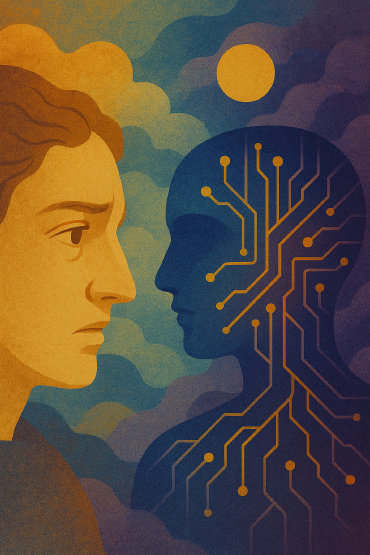Rediscovering Human Dignity and Ethics in the Age of Artificial Intelligence
Influence of Artificial Intelligence
Today, artificial intelligence technology has deeply permeated our daily lives, leading to extensive changes in our way of living, human relationships, modes of thinking, and social systems as a whole. The advancement of technology goes beyond mere progress of tools, posing fundamental questions that reexamine the boundaries of human existence and ethics. Behind the remarkable possibilities presented by artificial intelligence, unresolved uncertainties and ambiguities still coexist. It is at this juncture that the 'aesthetics of uncertainty' offers profound insights into the contemporary world where humans and technology confront each other.
The relationship between technology and human emotions
The way technology intervenes in human emotions, relationships, and moral judgments is gradually entering the realm of reality. Recently, some AI services have attempted to analyze conversation or emotional data between users, aiming to interfere with the most intimate aspects of privacy. This suggests that technology can penetrate not only simple technological progress but also the inner workings of humans and the realm of ethics, simultaneously leading to new forms of moral conflict and anxiety. In particular, situations where emotional cues captured by AI can be interpreted and used by third parties remind us of the complexity of human existence and its ethical vulnerabilities.
Conflict between technology and ethics
The conflicts that arise at the intersection of technology and ethics are not merely issues surrounding the use of technology. No matter how precise the data may provide patterns, human emotions are of a different nature than numbers. Humans are beings that embody uncertainty and contradiction, always containing narratives, context, and the unpredictable amplitude of emotions. Behind the 'accurate judgments' presented by technology, there inevitably follows room for interpretation and gaps in accountability, and these limitations further highlight the urgency of human morality and sensitivity.
Social Risks of AI
In fact, the errors or biases that may arise when AI makes judgments in areas such as crime prediction, employment evaluation, and credit analysis can seriously threaten individual rights and social justice. At this point, the question of who bears responsibility and who will respond to the harm caused by technological misjudgments is difficult to resolve completely within the existing legal and institutional framework. Therefore, there is an urgent need to redefine how humans will take responsibility for technology-driven decisions and what ethical standards will be applied.
Recognition of Imperfection
At the heart of all this discussion is an attitude that acknowledges human 'imperfections.' Relying entirely on technology and expecting clear answers may be an illusion. Rather, humans are complex and exceptional beings, and from the moment we recognize this, we can use technology more reflectively as a tool. An attitude that respects the gaps and ambiguities within humans that technology cannot fill is, in fact, the important ethical awareness that the 'aesthetics of uncertainty' presents to us.
The necessity of preparing for the future
Our gaze towards the future should not only be directed towards technological advancements. The relationship between humans and technology demands more than functional efficiency. Humans must confront their own limitations while learning and fulfilling their roles as responsible agents. For this, continuous evolution of ethical standards, the establishment of transparent policies, and the creation of international cooperation frameworks must proceed in tandem.
The Aesthetics of Uncertainty and Human Dignity
In conclusion, the 'aesthetics of uncertainty' is not merely about accepting the limits of technology, but an attitude that reaffirms human dignity and ethical subjectivity beyond that. It views human imperfection not as a flaw but as an essence, and strives to discover new possibilities for wisdom and reflection within it. In the age of artificial intelligence, we must move towards a sustainable future where we do not lose humanity and responsibility through harmonious coexistence with technology. In an uncertain future, upholding steadfast human values is the ethical courage we must embrace today, and it will be the wisdom for tomorrow.

Post a Comment